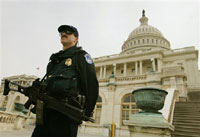US homeland security bill offers billions of dollars to fight terrorism
Union bargaining rights for airport screeners are still at issue as the U.S. Senate moves toward passage of a broad homeland security bill offering billions of dollars to state and local emergency workers to fight terrorism.

The House has already approved the bargaining rights, and the Senate did so in a more limited form, but a threatened veto from U.S. President George W. Bush will force congressional negotiators to review the collective bargaining issue again when they try to merge the two bills.
A final vote on the Senate bill was expected Tuesday. The House passed its measure in January - one of six bills on new Speaker Nancy Pelosi's first 100 hours agenda intended to establish Democrats as firmly in control of Capitol Hill after the November election.
The bills differ in many respects, but both call for enacting the remaining recommendations of the bipartisan commission that investigated the terrorist attacks of Sept. 11, 2001.
One significant difference is the way homeland security money is divvied up among the states. The House bill is more to the liking of the Bush administration, because a greater amount of the spending would be based on risks and vulnerabilities.
The House version is also more in line with the 9/11 commission's final report, which concluded that "homeland security assistance should be based strictly on an assessment of risks and vulnerabilities," adding that "Congress should not use this money as a pork barrel."
The Senate version would allow a larger amount of funds to be divided equally among states to ensure that all localities have certain basic capabilities to respond to any emergency, whether natural or caused by man.
The House assigned no price-tag to its bill, but the Senate version calls for a total of US$3.1 billion (EUR 2.4 billion) in spending for grant programs for each of the next three years. Of that, US$1.3 billion (EUR 1 billion) is specified for high-risk urban areas.
Both bills provide money to state and local emergency responders to improve emergency communication systems. The House bill again had no price-tag, but the Senate would authorize US$3.3 billion (EUR 2.5 billion) over five years.
The House and Senate bills also differ on how to deal with cargo containers that could hold a nuclear bomb or a so-called dirty bomb using conventional explosives to spread radiation. The House bill calls for radiation screening in foreign ports of all U.S.-bound cargo containers within five years. The Senate rejected a similar measure and the White House says it would be too costly and would slow commerce to a crawl.
The House bill also would require 100 percent screening for explosives of all cargo loaded onto passenger aircraft. The Senate gives airport screeners more flexibility, the AP says.
Despite several amendments that still required votes Tuesday, Senate leaders predicted easy passage for the bill. The one looming controversy that remains is that of union rights for Transportation Security Administration screeners.
Both bills also provide whistleblower and collective bargaining rights to 45,000 airport screeners whose jobs were federalized when the Home Security Department was created in response to the Sept. 11, 2001, terrorist attacks. Congress forbade collective bargaining for them then and Republicans boast they have the votes to uphold a veto by Bush over the issue.
Subscribe to Pravda.Ru Telegram channel, Facebook, RSS!


